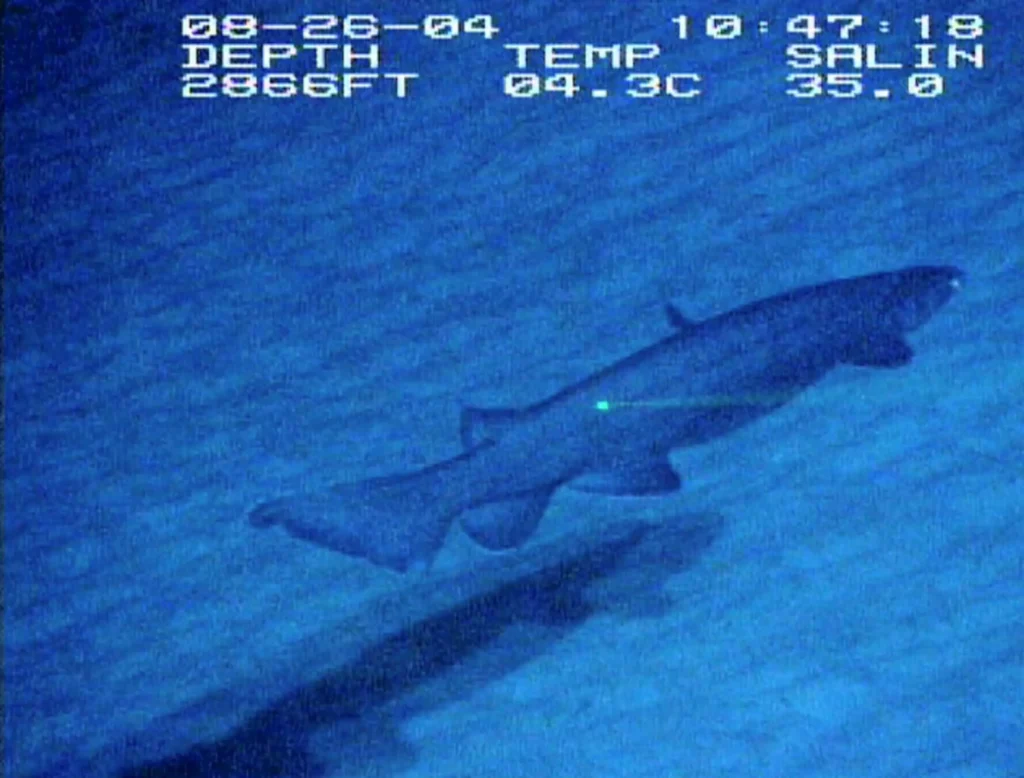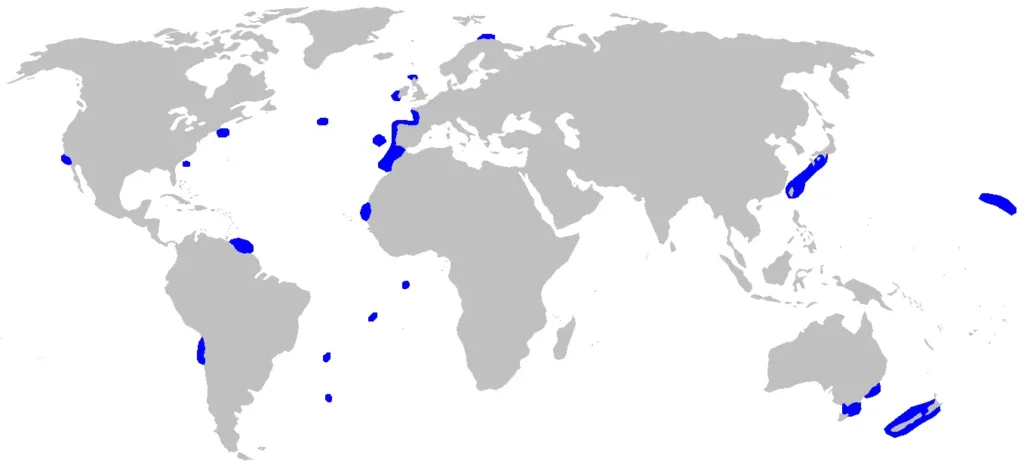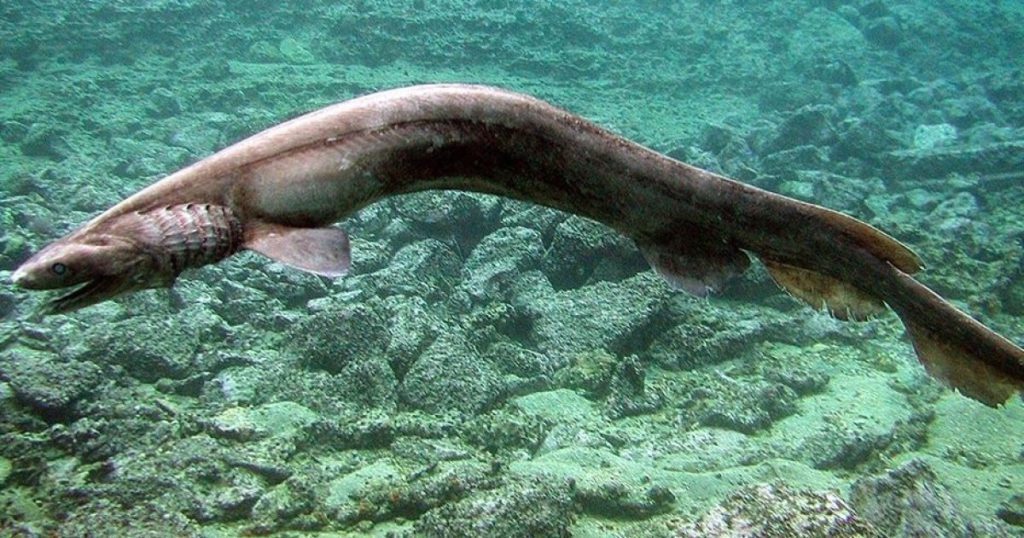Cape Shark (Chlamydoselachus anguineus)- one of the oldest and most mysterious sharks in the world. This species has existed on Earth for more than a century. 80 million years oldwhich makes it a true living fossil.
🔹 What is unique about the cape shark?
✔ Has an acne-prone body "it looks like a sea snake
✔ Preserved ancient features - little changed since the time of the dinosaurs
✔ A rare and poorly studied species - lives at great depths
✔ An unusual way of hunting - wraps the victim in its jaws
✔ Viviparous species - bears young up to 3.5 years, the longest among vertebrates
This view remains one of the most mysterious sharks in the world, because it lives at depths inaccessible to conventional exploration.

Scientific classification
🔬 Cape shark taxonomy:
✔ The Kingdom: Animals (Animalia)
✔ Type: Chordal (Chordata)
✔ Class: Cartilaginous fish (Chondrichthyes)
✔ Row: Cape sharks (Hexanchiformes)
✔ Family: Cape sharks (Chlamydoselachidae)
✔ Gender: Chlamydoselachus
✔ View: Chlamydoselachus anguineus
📌 Interesting!
This is one of the oldest shark species, which preserved the features of its ancestors who lived in the Mesozoic era.
Description and anatomy
🔹 Appearance:
✔ The body is long and flexible, resembles a sea snake or eel
✔ Color: dark brown or gray
✔ The head is flattened, with big eyes
✔ The jaws contain 300 teethlocated in 25 rows
✔ Six gill slits (most sharks have five)
✔ The dorsal fin is small, located closer to the tail
✔ The fins are broad and resemble a cloak, hence the name
🔹 Sizes:
✔ Length: as usual 1.5-2 m, maximum value – up to 2.7 m
✔ Weight: to 10 kg
✔ Life span: about 25 years old
📌 Interesting!
Unlike other sharks, the cape shark can swallow prey equal to half its size!

Range and habitat
🌍 Where does the Cape shark live?
✅ Deep water areas of the Atlantic and Pacific oceans:
• Europe: off the coast of Norway, Portugal, Spain
• Asia: Japan, Taiwan
• North America: coast of the USA and Canada
• Australia and New Zealand
• Africa: South Africa, Namibia
🔹 Living environment:
✔ Depth: 200-1200 m, sometimes up to 1500 m
✔ Water temperature: 4–10°C
✔ Prefers the continental shelf and deep-water ridges
📌 Interesting!
The cape shark is very rarely caught alive because of its deep-sea lifestyle.
Lifestyle and behavior
🔹 Behavior features:
✅ Solo lifestyle - does not form flocks
✅ Active at night - hunts deep-sea fish and squid
✅ Swims, bending the body like an eelrather than using the tail
📌 Interesting!
Unlike most sharks, the cape shark it doesn't have fast jerks, and moves smoothly and slowly.
Food and hunting
🔹 What does the Cape Shark eat?
✅ Deep-sea fish
✅ Squid and octopus
✅ Small sharks and rays
🔹 Hunting method:
✔ Attacks suddenly, like a snakeBy bending the body in the form of the letter "S"
✔ Opens its mouth widegrabbing prey with trap-like teeth
✔ Twists the body around the victim, holding it in its jaws
📌 Interesting!
Its 300 teeth have a curved shape, which does not allow prey to escape.
Reproduction and life cycle
🔹 Features of reproduction:
✔ Viviparous - bears cubs inside the body
✔ Gestation lasts up to 3.5 years! - the longest period among vertebrates
✔ In a litter-from 2 to 15 cubs
✔ Newborn sharks are 40-60 cm long
📌 Interesting!
Through extremely long gestation period the population of this species is recovering very slowly.

Cape Shark and Man
🔹 Human interaction:
✅ Rarely found - lives at great depths
✅ Not dangerous for a person, because it avoids contact
✅ From time to time it gets caught in fishing nets
🔹 Threats to the public:
❌ Deep-sea commercial fishing
❌ Changes in ocean temperature
❌ Accidentally caught in trawler nets
⚠ Population status:
* Considered rare, although the official status has not yet been determined
* Some countries, such as Japan, are taking measures to protect it
📌 Interesting!
In Japan, cape shark meat it is considered a delicacy.
Conclusion
🌊 The Cape Shark is one of the most mysterious sharks on our planet.
🦈 Its prehistoric appearance, unusual hunting habits, and slow reproduction make it unique among marine predators.
📢 If you met this shark on the high seas, what would your feelings be? 😲